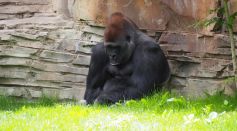ENVIRONMENT & CLIMATE

Mutations That Affect Aging May Be More Common Than Previously Thought
Cluster Anemones in Mediterranean Sea May Belong to Two Species

The Neural Cruelty of Captivity: Keeping Large Mammals in Zoos and Aquariums Damages Their Brains
Researchers Date the Historic Ilopango Eruption That Destroyed Part of the Maya Civilization

Common Insecticide Imidacloprid Harms Beneficial Insects
A New Study Traces Development of Gill Covers in Fishes

Flowers Adapt to Climate Change by Changing in Color

Unique Enzyme Combination Could Reduce Global Plastic Waste

Researchers Turn to AI to Protect Orchids and Other Threatened Species

Are Cows Dangerous? England Authorites Report Two Cattle Attack Deaths This Month

Vivid Color of Tarantulas Are Associated With Perceiving One Another & Survival

Developing Coronavirus Vaccines Are Harming Shark Species
Woman Horrified To Find 20 Venomous Mouse Spiders on Her Pool
Intense Solar Activity Is Bringing the Northern Lights To the United States
Most Popular

NASA Reveals an Astronaut Was Medically Evacuated From the ISS for the First Time After a Non-Emergency Health Scare

How the Immune System Fights Diseases: Antibodies, Vaccines & Lasting Protection

Sun Reaches Solar Maximum: What the Intensifying 11-Year Solar Cycle Means for Earth

Ancient Interbreeding Between Neanderthals and Modern Humans Revealed





